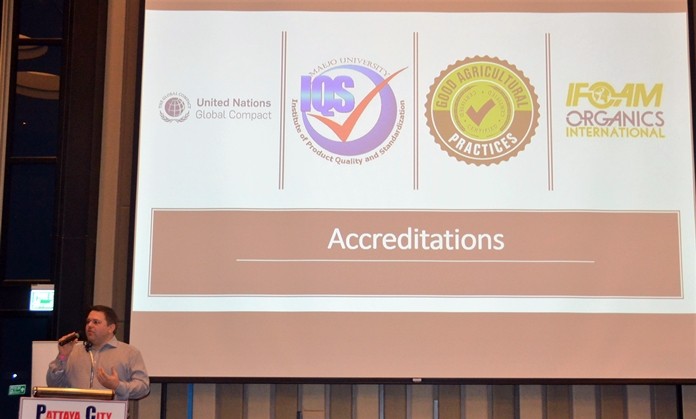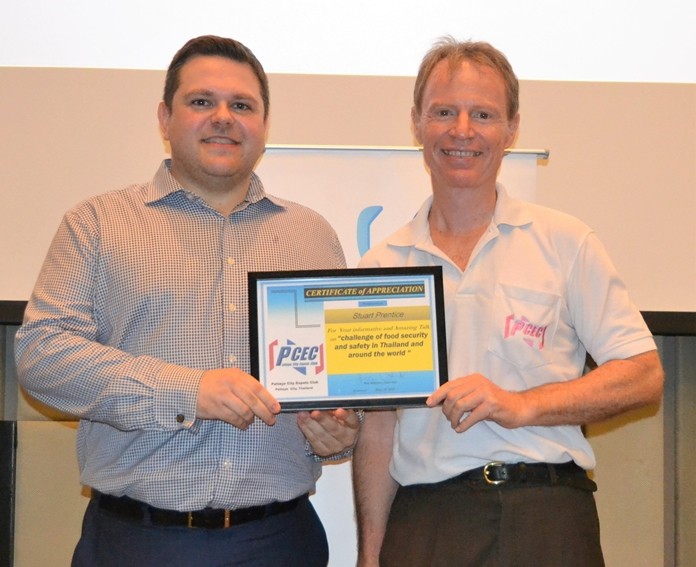
As a child, were you told to “eat your food, remember all those starving children in China”? Well the problem is getting worse: one in nine people around the world is hungry; and the population is predicted to reach 9 billion by the year 2050. Stuart Prentice spoke on the challenge of Food Security and Safety at the Pattaya City Expats Club (PCEC) meeting on Sunday, May 12. He discussed how aquaponics technology can go some way to provide solutions to these problems.
Stuart has been in Asia for the past 5 years and worked in Hong Kong, Singapore, Bangkok and Dubai on hydroponics projects. He is now the Asia Director for Midas Aquaponics based in Bangkok. Midas Aquaponics operates sustainable and responsible farms across Asia. Their fully operational flagship farm started in 2015, produces a variety of fresh lettuces, herbs and fish. It covers 32 rai and is located in Doi Saket, in the region of Chang Mai, northern Thailand.

Aquaponics turns a people intensive and weather susceptible industry on its head and increases yield for less resources, in terms of water, land and labour. According to Wikipedia, aquaponics refers to any system that combines conventional aquaculture (raising aqua animals such as snails, fish or prawns in tanks) with hydroponics (cultivating plants in water) in a symbiotic environment.
In Stuart’s opinion, no country has full food security. Over 20% of farming land in China is poisoned. He believes high tech farming is hopefully the solution for many climate problems. It is easier to adapt to bad weather with hydroponics, for example growing in contained structures. Whole crops are not wiped out by bad weather as in traditional farming. During the pollution problems in Chang Mai, vents had to be closed in their structures. There are many factors impacting on food production, such as lettuce rationing in the UK after flooding in Spain and fish stocks become depleted; thus, making aquaculture necessary.
He discussed how aqua technology can go some way to provide solutions to these problems. Compared to traditional growing methods there is an increase in harvest cycles when crops are grown in water versus soil.
Nutrient rich water is used. Traditional agriculture is the biggest contributor to climate change. Agriculture irrigation is the biggest use of water; with recycling, Aquaponics uses 90% less water. Aquaponics is growing in a controlled environment (light, temperature, humidity) so is safer with less waste; it is 100% pesticide free. Nature is replicated as much as possible (e.g. natural light).
The Chang Mai project uses good agricultural practices and passes GAP (Good Agricultural Practices) certification every year. They are regular suppliers and meet the standards of certain hotels and wholesalers. Consumers are concerned and crops are selected with their preferences in mind. Diversification is important and kale and Japanese watermelon are recent crop additions. They have good quality staff there. As a result, they can export for a higher price. The aim is to grow locally and sell locally. Their Chang Mai project has 14 harvests of lettuce per year, 8 of herbs and 2 of fish (Australian crayfish).
Midas Aquaponics is planning to expand with another project northeast of Bangkok in Pat Chong. Information about aquaponics, the projects and investment may be obtained from www.midasaquaponics.com. However, PCEC emphasizes they do not endorse any of the speakers or their products, but provide a venue for information that may be educational, entertaining, or of otherwise interest to Expats. There was a great deal of interest in this relevant topic with many questions.
As usual, the meeting winds up with an update of current events and special interest groups, then is followed by the “Open Forum” where questions are asked and answered and comments made about expats living in Thailand. The Club meets every Sunday at the Holiday Inn Pattaya’s Executive Tower. For more information on the Club and their activities, visit www.pcec.club.
 |
 |
 |





